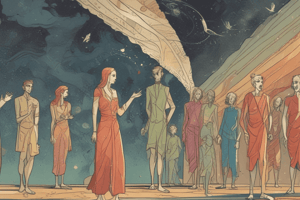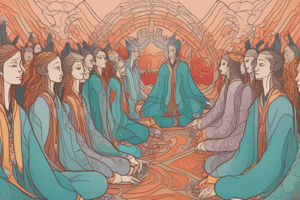Podcast
Questions and Answers
A collection of people who have relationships with one another is called a ______.
A collection of people who have relationships with one another is called a ______.
social group
The mutual interactive evolution of human biology and culture is known as ______.
The mutual interactive evolution of human biology and culture is known as ______.
biocultural evolution
In-groups are groups which one belongs and feels a sense of ______.
In-groups are groups which one belongs and feels a sense of ______.
identity
According to Lewis Henry Morgan's scheme, the highest stage of development is referred to as ______.
According to Lewis Henry Morgan's scheme, the highest stage of development is referred to as ______.
The condition that enables members of a social group to pursue shared goals is known as ______.
The condition that enables members of a social group to pursue shared goals is known as ______.
Simple social structures defined mainly by age and sex can be found in ______ groups.
Simple social structures defined mainly by age and sex can be found in ______ groups.
A ______ refers to structures of relationships between social actors and groups.
A ______ refers to structures of relationships between social actors and groups.
Cultural ______ is the notion that attitudes and beliefs are based on cultural context.
Cultural ______ is the notion that attitudes and beliefs are based on cultural context.
A ______ is more formal and established leader within a tribe.
A ______ is more formal and established leader within a tribe.
The ______ revolution introduced significant social, cultural, and political changes during the mid 1700s to 1800s.
The ______ revolution introduced significant social, cultural, and political changes during the mid 1700s to 1800s.
According to Greeks, society and its institutions are products of man's ______.
According to Greeks, society and its institutions are products of man's ______.
In modernization theory, society progresses from primitive to a more ______ stage.
In modernization theory, society progresses from primitive to a more ______ stage.
A ______ family is composed of parents and their children, also known as the immediate family.
A ______ family is composed of parents and their children, also known as the immediate family.
The ______ is an institution that addresses questions regarding limited resources within society.
The ______ is an institution that addresses questions regarding limited resources within society.
Charismatic authority is based on presumed special and extraordinary ______.
Charismatic authority is based on presumed special and extraordinary ______.
Legitimacy originates from the Latin word 'legitimare,' which means 'to declare ______.'
Legitimacy originates from the Latin word 'legitimare,' which means 'to declare ______.'
In a ______ kinship system, descendants are traced through both the male and female lines.
In a ______ kinship system, descendants are traced through both the male and female lines.
Monotheism refers to the belief in ______ god, while polytheism involves the worship of many gods.
Monotheism refers to the belief in ______ god, while polytheism involves the worship of many gods.
Flashcards
Social Group
Social Group
A group of people who have relationships with each other and share common goals, values, or principles.
Aggregate
Aggregate
A collection of individuals who are in the same place at the same time, but don't necessarily interact or share common interests.
Primary Group
Primary Group
A small, close-knit group where members have strong emotional ties and frequent interaction. They are usually informal and less specialized.
Secondary Group
Secondary Group
Signup and view all the flashcards
In-Group
In-Group
Signup and view all the flashcards
Out-Group
Out-Group
Signup and view all the flashcards
Reference Group
Reference Group
Signup and view all the flashcards
Social Network
Social Network
Signup and view all the flashcards
Tribe
Tribe
Signup and view all the flashcards
Headman
Headman
Signup and view all the flashcards
Chiefdom
Chiefdom
Signup and view all the flashcards
Industrial Revolution
Industrial Revolution
Signup and view all the flashcards
Modernization Theory
Modernization Theory
Signup and view all the flashcards
Family
Family
Signup and view all the flashcards
Kinship
Kinship
Signup and view all the flashcards
Marriage
Marriage
Signup and view all the flashcards
Economy
Economy
Signup and view all the flashcards
Educational Institution
Educational Institution
Signup and view all the flashcards
Study Notes
Social Groups and Interdependence
- A social group is a collection of people with relationships.
- Interdependence is crucial for groups to achieve shared goals or promote values.
- An aggregate is simply a collection of people in a particular place, lacking relationships.
Types of Groups
- Primary groups are small, intimate, and less specialized.
- Secondary groups are larger, less intimate, and more specialized.
- In-groups are groups a person belongs to and identifies with.
- Out-groups are groups a person doesn't belong to, often leading to competition or hostility.
- Reference groups are groups a person compares themselves to.
Theories and Concepts
- Self-categorization theory suggests that people's group memberships influence their perceptions of others.
- Social networks connect individuals and groups enabling diverse identity sources.
- Social media are modern forms of media.
Human Biocultural and Social Evolution
- Societies evolved as humans adapted to their environment.
- Biological evolution involves genetic and physical changes.
- Technological evolution involves creating tools and equipment.
- Biocultural evolution is the interaction between biology and culture.
- Lewis Henry Morgan's evolutionary scheme (Savagery, Barbaric, Civilized) described stages of development.
- Cultural relativism suggests that attitudes are culturally contextual.
Hunting and Gathering Groups
- Simple social structures based on age, sex, and labor division.
- Bands are small, nomadic groups with leaders focused on movement and resource distribution.
- Tribes are more formal organizations of several bands.
- Headmen lead tribes with more formal authority than band leaders.
- Chiefdoms unite tribes under a single chief.
Society as Natural Institution
- Ancient Greeks believed society was a natural human product.
- Humans are inherently social and political.
- Polis (city-state) was the highest form of human interaction.
Society as a Product of Social Construct
- Social institutions are products of social agreement.
Modernization Theory
- Societies progress from primitive to developed stages.
- Historical Materialistic perspective focuses on means of production and ownership.
- Bureaucracy is a hierarchical organization of officials.
- Organic solidarity occurs with specialized labor divisions.
Social Institutions
- Social institutions are organized structures of beliefs, rules, and relationships.
- Institutional approach views institutions as ordered rules, norms, and values.
- Relational approach emphasizes social relations.
Family
- Family is a vital social institution.
- Related by blood, marriage, or shared residence
- Nuclear family: parents and children
- Reconstituted family: spouses and children from previous marriages.
- Kinship refers to relations by blood or marriage.
- Matrilineal kinship: lineage through females.
- Patrilineal kinship: lineage through males.
- Bilineal kinship: lineage through both parents.
- Monogamy: one spouse at a time
- Polygamy: multiple spouses
Economy
- The economy addresses society's resource allocation.
- Liberal economists believe the market dictates resource distribution.
- Market is a self-regulating mechanism (Adam Smith).
- Bourgeoisie control the market; proletariat are laborers.
- Invisible hand suggests minimal government intervention; however, market failures are possible.
Educational and Health Institutions
- Educational and health institutions uphold basic human rights.
- Educational institutions ensure literacy.
- Health institutions ensure access to healthcare.
Religion
- Religion is a set of beliefs and practices centered around a divine entity.
- Church is a religion supported by society.
- Sect challenges societal norms.
- Monotheism: belief in one God.
- Polytheism: belief in multiple Gods.
- Animism: the belief that spirits inhabit natural objects.
Political Institution
- Politics involves creating, maintaining, and changing governing rules.
- Power is the ability to act.
- Authority is legitimate power.
- Legitimacy is the rightfulness of power.
- Traditional authority is based on customs.
- Charismatic authority is based on special characteristics.
- Legal-Rational authority is based on rules and laws
Studying That Suits You
Use AI to generate personalized quizzes and flashcards to suit your learning preferences.




